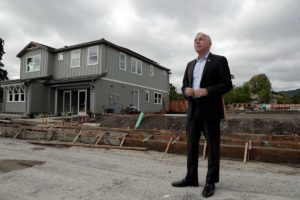Wealthy Bay Area suburbs could have a whole new look under California housing bill

“There’s a different level of anonymity that you have living in an urban environment,” he said.
With his group, Walnut Creek for Controlled Growth, Wickboldt has lobbied to preserve that quality of life as the city has grown in recent years to accommodate the Bay Area’s economic boom.
Now he worries those decisions may be taken out of Walnut Creek’s hands by SB50, which would loosen local control over housing development. The bill by state Sen. Scott Wiener, D-San Francisco, has generated controversy for its aggressive approach to tackling California’s housing shortage by promoting taller and denser construction, especially around public transit.
But it’s not just neighborhoods near major transit stops that could be transformed. Provisions in the bill that have gotten far less attention would essentially eliminate single-family zoning in the state by allowing any home or vacant lot in a residential area to be converted to up to four units.
“Many of us still consider this a suburb,” Wickboldt said. “And there’s a concern that we would grow in density in areas where we would lose that.”
In more populous counties, SB50 would also direct the state to designate “jobs-rich areas” — wealthy census tracts close to good schools and employment opportunities — where density restrictions would be eliminated. That would open the door for the construction of apartment buildings in places that have traditionally been limited to single-family homes, provided they met other local design standards such as height limits. Read more >>>